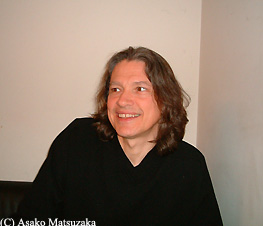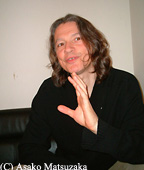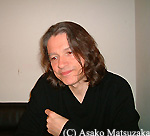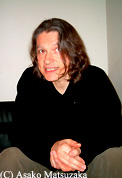
<Home>
Artist Press
Vol. 11> Feature: Robben Ford
Interview
witn Robben Ford
Live
Show Report: Robben
Ford Live at Motion Blue yokohama
Interview with
Robben Ford
Go
to Japanese
Sizzling
groove and sophisticated blues feelings...
Robben Ford, the innovator of contemporary
blues reveals the truth in blues guitar play.
 |
=-=-=-=-=-=-=-=-=-=-=-=-=
Robben Ford Official Site: http://www.robbenford.com/
=-=-=-=-=-=-=-=-=-=-=-=-=
Tour
Album "blue moon"
Beat
Blues
Equipments and sounds
Message...Peace
Tour
Robben
Ford(R):
OK! Let's get started.(He spoke
by Japanese.)
Q: Where did
you learn Japanese?
R: Oh,
I've been coming here for years, you know, I just know little phrases.
Q:
But you speak it so fluently...About thsi Japan
tour, how do you feel about this tour?
R:
Well, it's a great pleasure to play with some of my old friends. And it's also
nice for me to finally play with my own group in Fukuoka for the first time and
also Osaka at the Blue Note, for the first time.
Album
"blue moon"
Q:I saw
the names credited on your CDs for this tour and was really looking forward to
listen to them in a live show.
About
"blue moon" album, I'd like to ask you some questions. You have put
out many albums with great blues feeling. The first thing struck me about "blue
moon" was the powerfulness and energy exerting in it throughout the tracks.
Will you be able to tell us little bit about the concept of this album and what
you wanted to realize in this album?
R: My last two records before this one, "Tiger walk", that was all instrunental, and "Supernatual" had a lot of variety with the song writing. So this record, although I enjoy always some variety, I wanted to make it more of a blues record than the last two. That was my only real concept.
Q:
My first impression was that the whole album was streamlined with blues tone.
And
each of the songs has very new atomosphere with underlining blues tone and that
was really interesting and that's something that kept me going through the album.
R: Pretty much!
Q: When you work on a song, how do you construct composition, how do you arrange the tune, where do you get ideas?
R: I... hmmm, that's hard to answer! I don't think about it very much. If I'm covering a song, it can be different from the original or maybe very much the same. Just if some inspiration comes to me about a song, I would go with the inspiration, but sometimes I like a song very much the way it is and I know that the people who are playing with me would put something in it that would make it sound new without trying too hard. So really often I just trust my musicians.
Q: What are your favorite songs from "blue moon"?
R:
Yes, I like very much "It Don't Make Sense", the Willie Dickson song,
that's very special, I think. And I'm really happy with our performance of it,
I think we did something personal and unique with that.
And I also like very
much the song called "Good to Love". It's unusual for me. It's an old-timey
two beat song. And the song, the lyric came really easily, like a personal story,
and so to me is a successful composition. Sometimes I'm happy with a composition
but not all of it. This song I think is a good song writing. I'm always very happy,
when I can say that I feel like I really wrote a good song It's hard to do.
Beat
- a good rhythm
guitar player should think of himself as a drummer
Q: You mentioned the beat. In your song, I feel great groove going on in your compositions. Even for old-timey blues tunes.
R:
Most of my music, when I do a cover it's usually like Chicago blues from the 50's.
I like Little Walter, Howlin' Wolf, Muddy Waters, that style. That's the music
I listen to generally if I want to find a cover. And also old B.B.King.
 Q:
Your band is really good at creating groove. Do you do something to get it going?
Q:
Your band is really good at creating groove. Do you do something to get it going?
R:
Yeah, that's what they do. Well, we use the record as the reference point. And
we talk about things a little bit and we allow things to change, I mean, as we
play, we find what works.
Q:
The way you perform the rhythm is so exquisite. What are the things you hold onto,
when you create the rhythm?
R: Oh, thank you. The main thing is some kind of repetition. Basically a good rhythm guitar player should think of himself as a drummer. And from there, instead of a beat, I have a chord. And then I try to find some small thread to link the chords together, little theme, little melody, so it kind of builds like that: rhythm, chord, melody.
Q:
That was a very good explanation thank you.People always talk about your music
being based on blues.
R:
Yeah!
Blues
is any feeling at all.
Q:
What does blues mean to you?
R: For me, blues is any feeling at all. So for me any kind of music can sound like the blues, if it's really good music, like Indian music. Also, I was watching some Japanese theater today, KABUKI, some of that sound like blues to me. And some classical music, you can hear blues, so…
Q: So it's more like a vehicle to express your feelings.
R: Exactly!
Q: Be it vocal or the guitar performance, what goes through your mind when you perform? What do you want to tell the audiencede?
R:
Generally I like to not have a lot of distractions, and I like to focus on my
playing. And the more I can just relax, the more I feel I'm able to connect with
the audience.
So my greatest concern is actually what's happening on the stage,
with the band.
If the group is feeling good and really being supportive and
right there for me, I can just relax and open up. Otherwise I'm thinking about
what's going on on the stage, that's a terrible feeling.
Equipments
and sounds -Total commitment. Total
focus.
 Q:
Now about your guitar tones. Your guitar sounds so smooth and you can express
a lot by just playing one note, very clear and resounding. How do you do that
?
Q:
Now about your guitar tones. Your guitar sounds so smooth and you can express
a lot by just playing one note, very clear and resounding. How do you do that
?
R:It really comes from
listening to others first. And, really letting the great sound of artists you
admire, come into your body. And then, it's important to have good instruments.
But maybe even more important is to work with whatever you have. And find, what
works with yourself. You have to not look too much outside yourself for good sound.
Find your sound inside your body. And then you have to play like you are "shouting
at the waves". Do you know this expression "shouting at the waves"?
I read this in a book written by a Japanese musician who lived in Hawaii,
He wrote a book called ZEN GUITAR. And I think "shouting at the waves"
is like, the waves are so huge and loud, but you can shout at the waves and still
be heard. It's like a "KATSU" in the martial arts. That's where it comes
from. Total commitment. Total focus.
Q:
That's so wonderful!
R: Good.
Q: We go spiritual here!
R: That's where it goes!
Q: Would
you be able to tell us what your equipment is?
R:
My equipment? I use the Dumble amplifier, I use Baker Guitar, 1960 Fender Telecaster,
and I use Earnie Ball volume pedal, and Dunlop wahwah pedal, and TC Electronics
2290, it's rack for delay. That's it.
Gene Baker, the Baker is the new Robben
Ford model. I no longer work with Fender. They are too corporate.
Message..."Peace"
Q:May I ask you two more questions?
R: Two more questions.
 Q:
In your oldest memories what sounds can you recall?
Q:
In your oldest memories what sounds can you recall?
R:
Well, two things just came to mind, first thought. One was the Miles Davis' trumpet.
But I didn't hear that till later. So that's hard to say, not sure but...Also
the first time I heard a gun fired, I never forget it. Whoa! Just like somebody
shooting at cans, practice shooting. Very intense, hurt my ears so bad. You know
that sound? I never like guns from that point on.
Q:
Can you recall when it was?
R:
Yeah, I was maybe 12 years old.
Q:
Can we have a message for the fans?
R:
Oh, message. The dreaded message. Hahaha! I don't know what to say...Peace. That's
it for me.
Q:
That's very important. More important now than ever. Thank you very much today
====================
Besides being a superb musician, Robben Ford is a wonderful
person of great sincerity and honesty. His words, "Total commitment. Total
focus" truly represent his attitude towards music. ((At Motion
Blue yokohama,
Aprl 12, 2003)
====================
Interview by Asako Matsuzaka
Photography by Asako Matsuzaka
Translation
and support for covering by Tatsuro Ueda
Many thanks to Motion
Blue yokohama
Copyright (C) 2003 Global Artist Network. All rights reserved.